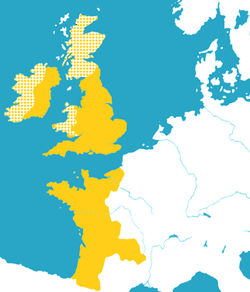安茹帝國
外觀
此條目可參照外語維基百科相應條目來擴充。 |
安茹帝國 | |
|---|---|
| 1154年–1214年 | |
 安茹帝國極盛,於1189年 | |
| 地位 | 共主邦聯、帝國 |
| 首都 | 沒有固定首都,法庭一般在昂熱和希農舉行。 國王大多定居於法蘭西領土。 |
| 常用語言 | 古法語 (通用語言) 拉丁語 (官方語言) 諾曼第 (諾曼法語)、英格蘭上層 (盎格魯-諾曼語)、英格蘭下層 (中古英語)、阿基坦 (普瓦圖方言、奧克語、巴斯克語)、威爾斯 (中古威爾斯語)、布列塔尼 (布列塔尼語)、愛爾蘭 (中古愛爾蘭語) |
| 宗教 | 羅馬公教 (官方) |
| 政府 | 封建君主制 |
| 國王、親王、公爵、伯爵、爵士 | |
• 1154年–1189年 | 亨利二世 |
• 1189年–1199年 | 理查一世 |
• 1199年–1216年 (安茹帝國實質瓦解於1214年) | 約翰一世 |
• 1216年–1259年 (de jure統治) | 亨利三世 |
| 歷史時期 | 中世紀 |
| 1154年10月25日 | |
• 布汶戰役,丟失了諾曼第和安茹 | 1214年7月27日 |
• 巴黎條約 | 1259年12月4日 |
| 貨幣 | 里弗爾、銀便士、金便士 |
| 今屬於 |
|
安茹帝國(Angevin empire)是一個歷史術語,是歷史學家對金雀花王朝統治英格蘭和法蘭西西部時代的稱號。
12世紀後半葉開始,由英格蘭國王亨利二世和他的繼承人理查一世和約翰統治的安茹帝國。安茹帝國幅員從蘇格蘭直到比利牛斯山。因為亨利的父親為安茹伯爵,因此三位國王都稱為安茹國王。1150年,亨利二世為諾曼第公爵,1151年,亨利二世為安茹伯爵,1152年,與阿基坦的埃莉諾結婚,成為阿基坦公國的繼承人。1171年亨利二世之子傑弗里任布列塔尼公爵,布列塔尼也併入安茹帝國。1154年亨利二世成為英格蘭國王,直接統治全英格蘭和南威爾斯,對北威爾斯的領土圭內斯有宗主權。1171年,安茹王國吞併愛爾蘭。1174年—1189年蘇格蘭臣服於亨利二世。1214年亨利二世的兒子約翰因為喪失了在歐洲大陸除吉耶訥以外的領土而被稱為無地王約翰。
參考資料
[編輯]- ^ The term imperium is used at least once in the 12th century, in the Dialogus de Scaccari (約1179), Per longa terrarum spatia triumphali victoria suum dilataverit imperium (Canchy, England, p. 118; Holt, 'The End of the Anglo-Norman Realm', p. 229). Some 20th-century historians have avoided the term empire, Robert-Henri Bautier (1984) used espace Plantagenêt, Jean Favier used complexe féodal. Empire Plantagenêt nevertheless remains current in French historiography. Aurell, Martin. L'Empire des Plantagenêt, 1154–1224. Perrin. 2003: 1. ISBN 9782262019853.


